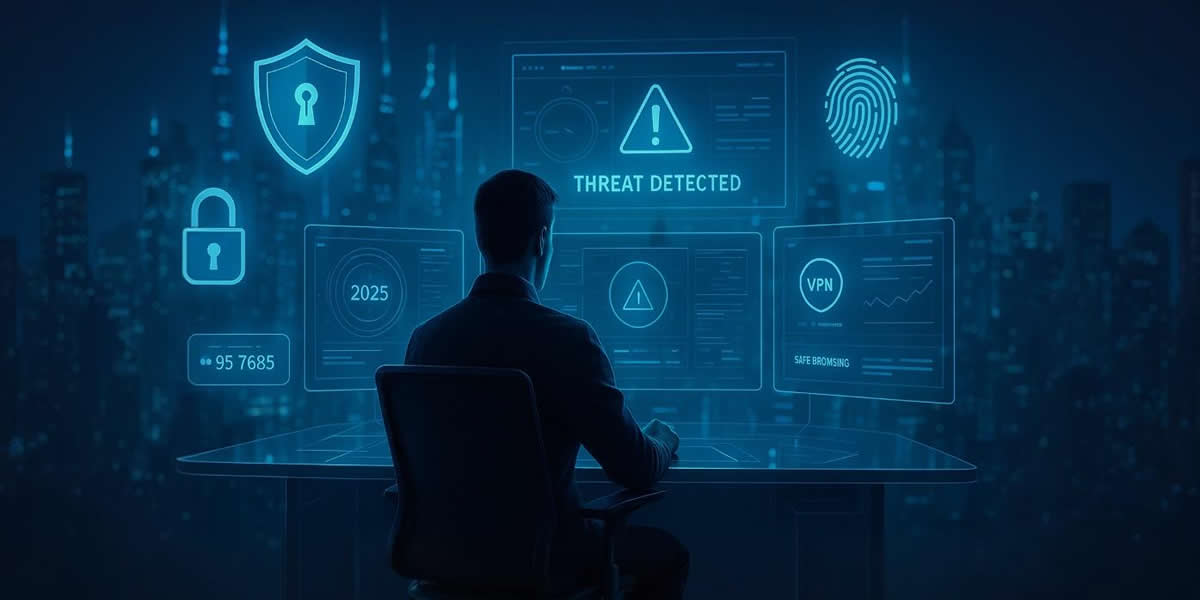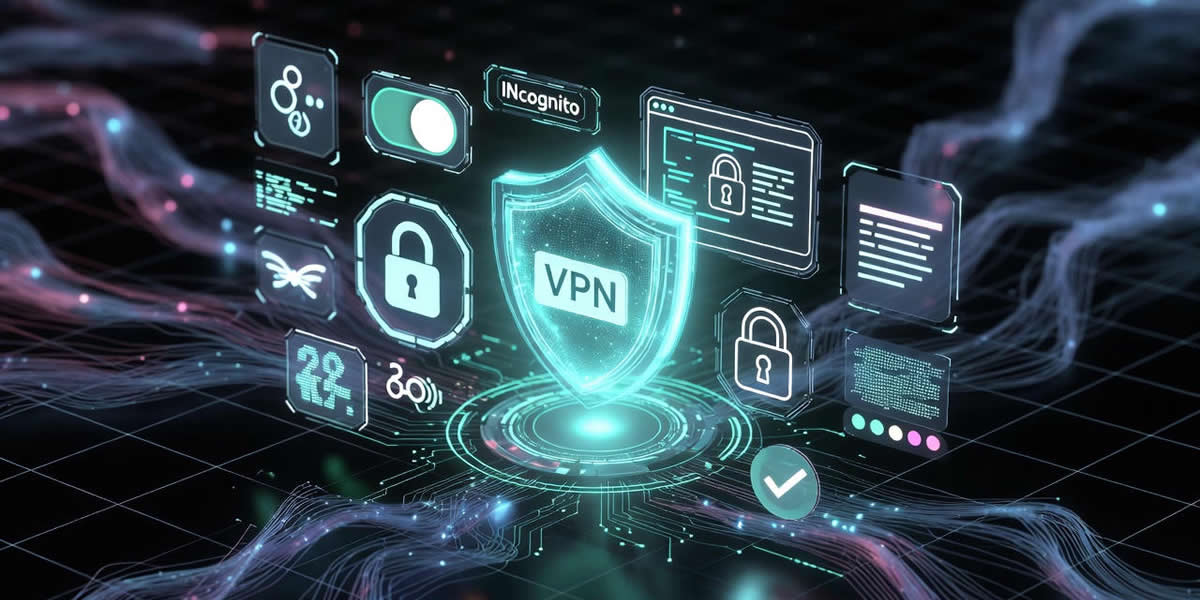In 2025, the internet is considered a second home for a large percentage of the population. We continue to buy, share documents, and maintain a significant part of our lives in the cloud, and occasionally panic-search, “Why is my laptop buzzing like a bee at 3 AM?” Still, the digital realm has become, to a large extent, more user-friendly and intelligent, but the snares of the scam world have certainly upgraded their game as well.

The frauds of today have become so advanced that at times it becomes hard to differentiate between them and the legitimate apps, newsletters, or even browser extensions that one uses for help. The hackers, these days, are not just spreading viruses indiscriminately; they are instead very often relying on AI, social engineering, and psychological tricks to ensnare even the best-informed users.
So yeah… staying safe online isn’t optional anymore. It’s survival.
Below are five powerful, practical tips to protect yourself in 2025 — no tech jargon, no boring lectures. Just stuff you can actually use every day.
1. Download Smarter, Not Faster
Let’s be honest: we all love downloading things. Apps, browser add-ons, games, PDFs, “free” editing tools, you name it. However, downloading is still the primary method by which malware infiltrates your device.
And in 2025, malware isn’t always obvious. It can look like:
- a fake iOS update file
- a “chat GPT mod”
- a free video editor
- or even a convincing landing page that mimics a brand
Once you tap download, it's game over if the file is malicious.
Stay safe by doing this every time:
- Only download from official app stores or the creator’s real website.
- Avoid pages with too many ads, multiple “Download now!” buttons, or redirects.
- Double-check the domain — subtle misspellings are a huge red flag.
- Scan everything with an antivirus before opening.
Not even entertainment sites are immune to deceptive downloads. One case in point is the highly regarded casino pinup platform, which is used by many, but scammers frequently set up fake imitations to capture user data. If you happen to be inattentive, a single erroneous click might take you to a counterfeit website that integrates malicious programs rather than amusing ones.
Bottom line: slow down, look twice, download once.

2. Don’t Reuse Passwords — Ever
If you take only one rule from this article, take this one.
The most significant online security disasters stem from password reuse. When a database leaks — and trust me, leaks happen constantly — hackers take those email-password combos and try them everywhere else: banking, social media, cloud storage, crypto wallets, gaming accounts, even shopping.
A single leak can turn into a full identity takeover in minutes.
Do this to protect yourself:
- Use a password manager (they do all the hard work).
- Let it generate long, unique passwords for every site.
- Turn on password breach alerts so you know instantly if something leaked.
If you’re logging into an entertainment site, using the same password as your email or Instagram is basically an open invitation for trouble. Always use unique codes for any site that involves money, personal data, or online payments.
A few minutes of setup = years of protection.
3. Update Everything — Even When You Don’t Feel Like It
I get it, nobody wants updates. They appear when you least want them, they consume a lot of time, and sometimes you think, “Never mind, I will do it later.” But updates are actually your hidden advantage. The majority of cyberattacks are not through cutting-edge, high-tech breaches, but rather the exploitation of unpatched, old vulnerabilities that people often forget about. Unsupported software is just like opening your front door for robbers because you feel too lazy to fix the lock.
Why updating matters so much:
- Fixes security holes
- Blocks new types of malware
- Protects your camera, microphone, and data
- Improves overall app stability
This applies to everything:
- iPhones
- Android phones
- Laptops
- Routers
- Smart TVs
- Browsers
- Password managers
- Even apps you barely use
Set auto-updates whenever possible. Then forget about it. If your device asks you to restart, just do it. It’s two minutes of peace for years of safety.
4. Be Suspicious of Anything Too Flashy, Too Urgent, or Too Free
Scammers have gotten stylish. They know how to design websites that look sleek, modern, and totally trustworthy. Some fake pages even use real brand names, stolen logos, and AI chatbots to appear legit.
A common trick is using urgency:
- “Your account was locked! Log in now!”
- “Claim your refund!”
- “Download this required update!”
- “Your system is infected — fix immediately!”
They pressure you emotionally, not logically.
Here’s the rule: If something makes you panic or rush, take a step back.
Also, watch out for:
- PopUp warnings
- “Download to continue” messages.
- Fake browser update prompts
- Suspicious email attachments
- links that redirect three times before landing
And always double-check domains of pages involving money or deposits. Fraudsters often mimic popular platforms to trick people into entering payment details.
Take a breath. Check twice. This one habit alone prevents 80% of digital disasters.
5. Protect Your Identity: VPN, Privacy Settings, and Smart Browsing
Privacy isn’t a luxury anymore — it’s your digital armor.
Your browsing habits, location, device info, and login patterns are constantly tracked, sometimes by legit companies, sometimes by… less legit ones. The more exposed you are, the easier it is to target you with scams, phishing attempts, or malware campaigns.
Here’s how to lock down your digital identity in 2025:
Use a VPN

It hides:
- Your location
- Your IP
- Websites you visit
Especially useful on public Wi-Fi.
Limit App Permissions
Most apps don’t need:
- Your microphone
- Your camera
- Your photos
- Your location
Turn off anything unnecessary.
Use Private Browsing When Needed
It’s not perfect, but it stops casual tracking.
Avoid Logging In Everywhere
Not every site needs your real email.
Use throwaway emails for risky places.
Stay away from unknown “free” software.
Because free often comes with a price — your data. Being careful doesn’t mean being paranoid. It just means being aware that your digital identity matters as much as your real one.
Final Thoughts
You don’t need to be a tech wizard to stay secure on the Internet; you only need to have the right habits. Click things only after giving them a second thought, create difficult passwords, always have the newest version of your device, double-check sites very carefully, and treat your personal information as if it were your greatest possession—protect it. The online world will become increasingly complicated; however, with the proper strategy, you will be able to avoid problems easily.































